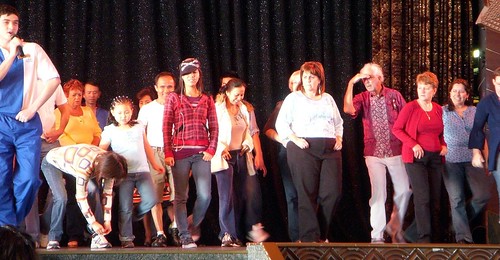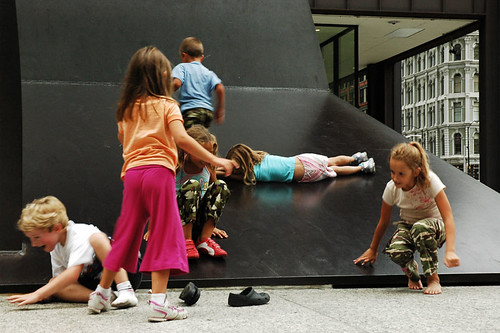(Note: this blog post dates from September 13th 2007 on my old blog. It had been in limbo since August 30th. There was so much more to add, but I decided it is time to put it in the wild and not lock the partial thinking in the “draft” queue! Now I am republishing it today as I have a coda to add and the older blog post is hard to find…)

The Original Post
I have been part of quite a few informal conversations recently about how to “learn how to do this web 2.0 stuff.” Not just learn it, but learn it in the context of it adding something useful to our work and lives. The volume, the subtleties of useful practice, can feel overwhelming. Our sense of inadequacy can paralyze.
In Cali, Colombia, I led a workshop about facilitating online interaction and we used the Social Media Game to add context to this flood of “cool new tools with weird names. ” I think the most engaged moment was when people were in small groups, explaining new tools to each other and thinking about what might be useful in their work. It was still pretty abstract. We did not get hands-on. But people noted that the tool stuff was of a great deal of interest.
I always try and promote the people and process stuff, but the reality is that tools are often the “door opener” to the process conversations because they are more tangible. So being able to “look over the shoulder” as someone uses the tools in a social context would be really useful.
In Bogota, Colombia at the very well attended “Quality in eElearning” conference I had a side conversation about ways to usefully use Twitter, Wikispaces and del.icio.us with a couple of my co-presenters, and a separate conversation with Jay Cross about doing an “Over the Shoulder” camp. Inthe instance with Ulf-Daniel Ehlers it didn’t start out as a conversation. I had mentioned and showed a Wikispaces page in my presentation the day before. During the third day where we were relaxed in the “participant” role, I was sitting next to Ulf and noticed he was messing with a wikispaces page he had set up. I showed him a couple of things. He shared a few links. Together, we figured out how to embed del.icio.us links into a Wikispaces page from a great blog post I had found a while back. In the mean time, Virginie Aimard was looking over from the other side, following silently along on our digital journey. Back and forth.
A few weeks later I was the guest for a “10 Minute Lecture” for Leigh Blackall’s Online Learning Communities course, centered in New Zealand. (You can see the slides, audio and Elluminate recording here.) The theme was peer learning – a communities of practice perspective. Leigh had initially asked me to talk specifically about Peer Assists, but I felt a larger issue tugging at me – this “over the shoulder” stuff.
We talked about this mode of learning from each other. I really enjoyed the conversation and poof, the hour was up. But then the blog posts from course members started showing up – those who were in the live session and those who viewed the recording. There the themes of inadequacy, of the pressure of time to do this learning, of possibility. I felt this little frisson of learning, that was a bit of learning over each others’ shoulders. For me, it was then important to comment on each of the blog posts that mentioned my name, thus showing up in my feed reader, because learning from each other has that back-and-forth quality. It is iterative. Conversational.
And so this thinking, doing, experiencing, advocating for over the shoulder learning comes back to a reflective blog post. Because reflection is the final piece that cements it together.
Comments from the original post on Blogger:
2 Comments:
Today’s Update
I have been sick with the flu the last 10 days, eliminating any chance of finishing my year end work and having time for reflection. I have an RFP that I have to respond to this week so I was reviewing some of my pertinent materials – particularly those related to peer learning and online facilitation.
I realized I have never classified much of my work as “peer learning.” More often this has come under the rubric of learning from and with each other in networks and communities (i.e. communities of practice, etc.) I have had a bias for on-the-job, in-the-moment, just-in-time and informal learning, supported with appropriate formal and structured learning. These peer based options give us the opportunity to learn both in context and with the give and take that reveals the texture and nuances of those contexts.
It is beyond obvious to state that digital technologies have expanded our possibilities for these peer learning forms. So the reflective question going back, and the learning agenda question going forward is what will advance and deepen our ability to learn with and from each other in the coming year?
What do you think?
 Yesterday I was interviewed about “making mistakes in public” and how that allows us to get feedback and learn from others. My friend Philip Tarlow mentioned this Picasso quote to me last week, and it struck me as being about our learning edges. Doing things we aren’t quite sure we know how to do. Taking risks in the name of learning and doing.
Yesterday I was interviewed about “making mistakes in public” and how that allows us to get feedback and learn from others. My friend Philip Tarlow mentioned this Picasso quote to me last week, and it struck me as being about our learning edges. Doing things we aren’t quite sure we know how to do. Taking risks in the name of learning and doing.

 Beth Kanter said…
Beth Kanter said… annelizbeth said…
annelizbeth said…